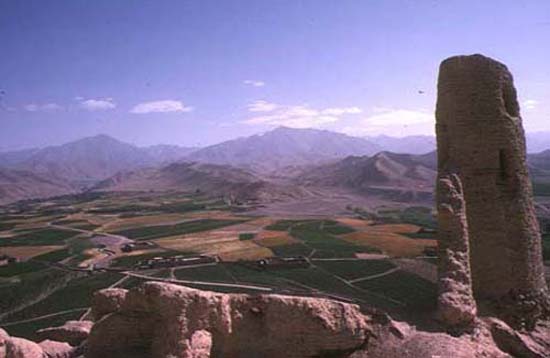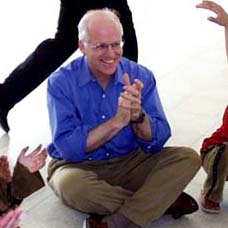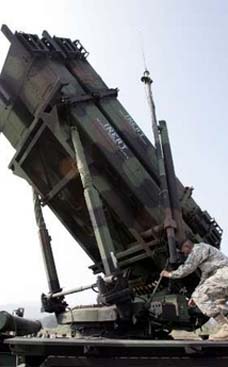2006.10.17: October 17, 2006: Headlines: COS - Morocco: COS - Afghanistan: Journalism: Canada: Globe and Mail: Jeffrey Simpson writes: We can only hope, perhaps against hope, that Sarah Chayes is wrong
Peace Corps Online:
Directory:
Afghanistan:
Special Report: Writer, Journalist, and AID Worker Sarah Chayes (RPCV Morocco) and her work in Afghanistan:
Sarah Chayes: Newest Stories:
2006.10.17: October 17, 2006: Headlines: COS - Morocco: COS - Afghanistan: Journalism: Canada: Globe and Mail: Jeffrey Simpson writes: We can only hope, perhaps against hope, that Sarah Chayes is wrong
Jeffrey Simpson writes: We can only hope, perhaps against hope, that Sarah Chayes is wrong

If her description and analysis of what has been happening is correct, then the Canadians stationed in Kandahar province are operating at least partly under false assumptions. Forty-two Canadian soldiers have died there, two on the weekend. Others have been wounded, their lives scarred forever. Afghanistan is now Canada's largest recipient of foreign aid. Parliament has approved a two-year extension of Canada's mission there. And the government insists that Canada will "finish the mission" and "get the job done." Morocco RPCV Sarah Chayes has made a home in Kandahar, Afghanistan, became fluent in Pashto, one of the main Afghan languages, and devoted her energies to rebuilding a country gutted by two decades of war
Jeffrey Simpson writes: We can only hope, perhaps against hope, that Sarah Chayes is wrong
Pay attention to this voice in the Afghan wilderness
JEFFREY SIMPSON
From Tuesday's Globe and Mail
We can only hope, perhaps against hope, that Sarah Chayes is wrong. Ms. Chayes, a U.S. radio reporter turned civil society advocate who has lived largely in Kandahar since 2002, recently published an engrossing, angry, hopeful, sometimes poetic book, The Punishment of Virtue: Inside Afghanistan After the Taliban, about her experiences.
If her description and analysis of what has been happening is correct, then the Canadians stationed in Kandahar province are operating at least partly under false assumptions. Forty-two Canadian soldiers have died there, two on the weekend. Others have been wounded, their lives scarred forever. Afghanistan is now Canada's largest recipient of foreign aid. Parliament has approved a two-year extension of Canada's mission there. And the government insists that Canada will "finish the mission" and "get the job done."
But what if some of the assumptions on which this mission is based are wrong? What if, as Ms. Chayes suggests, Pakistan is deliberately destabilizing Afghanistan? What if Pakistan knowingly allows Taliban fighters to live and thrive across the border, gives them easy passage to and from Afghanistan, and pays complicit Afghan provincial governors and police officials?
What if it suits Pakistan's purpose to serve up the occasional al-Qaeda member to appear as a steadfast ally in the "war on terror," while Pakistan's notorious security service simultaneously and duplicitously encourages the Taliban? And what if, again as asserted by Ms. Chayes, corruption sanctioned and organized by Afghan officials is so pervasive that it has turned Afghans into at least closet Taliban supporters?
Putting the Chayes matrix atop the sort of official Ottawa/NATO/Washington line -- we are there to fight the Taliban -- produces a severe disconnect between that line and reality -- the Chayes reality being that the Taliban enjoy a safe haven in Pakistan and that endemic corruption, rather than the Taliban, is peace and stability's greatest foe. In other words, Pakistan and corruption are the fundamental enemies, while the Taliban are the deadly but surrogate ones.
Ms. Chayes tells a gripping story about individuals and senior officials caught up in post-Taliban Afghanistan. Her portrayal of U.S. policy is devastating. Washington blasted Afghans' hopes for a better future by making alliances with warlords. U.S. officials and soldiers constantly misunderstood who was doing what in a country they barely knew. Arms of the U.S. government -- the Pentagon, the State Department, the CIA -- often did not know what the others were doing.
Ms. Chayes played many roles: activist, journalist, observer, confessor, friend, foe, missionary. She clearly had favourites in Afghanistan, including President Hamid Karzai, who nonetheless disappointed her by refusing to move against warlords and corrupt provincial governors.
Her detailed story aside, The Punishment of Virtue depicts an entire country suffering from "collective post-traumatic stress disorder" in which no one trusts anyone outside their immediate circle. "Loyalties and allegiances are to individuals," she writes, not to government or legal institutions.
Afghan tribes have become accustomed to foreigners paying them tribute: British, Soviets, Americans, Canadians. Foreign money is a "badge of honour" to
be used by leaders to command loyalty.
The government in Kabul represents a yearning for national coherence, but it cannot compete with a deeper Afghan yaghestan: "dissolution into tribal units whose vertical ties are reinforced by the distribution of booty."
If this be so, then presumably much of the foreign aid in Afghanistan -- the vaunted "reconstruction money" -- has fallen and will continue to fall into corrupt hands for the political agendas of local strongmen.
"Kandahar," Ms. Chayes writes, "like much of Afghanistan, has survived through the years on three main sources of revenue: pillage, tribute or tolls, and subsidy. This latter is dutifully handed out by the Great (foreign) Power of the day, in an attempt to buy docility from the denizens of Yaghestan."
Wealth, often improperly amassed, exists amidst the overwhelming poverty, because "Kandaharis have a reputation for hiding their gold in rags and bones." Ms. Chayes says that, "even within Afghanistan, Kandahar is reviled. Its people are known as the greediest, the rudest and the most unruly, the most treacherous of all."
Ms. Chayes recently wrote in this newspaper that people in Kandahar "are deeply grateful for the presence, the courage, and the sacrifice of the Canadian troops. But . . . unless the Afghan government cracks down on its own corruption and brutality . . . villagers will keep making room for Taliban."
jsimpson@globeandmail.com
When this story was posted in November 2006, this was on the front page of PCOL:





Peace Corps Online The Independent News Forum serving Returned Peace Corps Volunteers
 | Harris Wofford to speak at "PC History" series
Senator Harris Wofford will be the speaker at the 4th Annual "Peace Corps History" series on November 16 sponsored by the University of Maryland at Baltimore County (UMBC) and the Maryland Returned Volunteers. Previous speakers in the series have included Jack Vaughn (Second Director of the Peace Corps), Scott Stossel (Biographer of Sargent Shriver), and C. Payne Lucas (President Emeritus of Africare). Details on the time and location of the event are available here. |
 | Chris Dodd's Vision for the Peace Corps
Senator Chris Dodd (RPCV Dominican Republic) spoke at the ceremony for this year's Shriver Award and elaborated on issues he raised at Ron Tschetter's hearings. Dodd plans to introduce legislation that may include: setting aside a portion of Peace Corps' budget as seed money for demonstration projects and third goal activities (after adjusting the annual budget upward to accommodate the added expense), more volunteer input into Peace Corps operations, removing medical, healthcare and tax impediments that discourage older volunteers, providing more transparency in the medical screening and appeals process, a more comprehensive health safety net for recently-returned volunteers, and authorizing volunteers to accept, under certain circumstances, private donations to support their development projects. He plans to circulate draft legislation for review to members of the Peace Corps community and welcomes RPCV comments. |
 | He served with honor
One year ago, Staff Sgt. Robert J. Paul (RPCV Kenya) carried on an ongoing dialog on this website on the military and the peace corps and his role as a member of a Civil Affairs Team in Iraq and Afghanistan. We have just received a report that Sargeant Paul has been killed by a car bomb in Kabul. Words cannot express our feeling of loss for this tremendous injury to the entire RPCV community. Most of us didn't know him personally but we knew him from his words. Our thoughts go out to his family and friends. He was one of ours and he served with honor. |
 | Chris Shays Shifts to Favor an Iraq Timetable
In a policy shift, RPCV Congressman Chris Shays, long a staunch advocate of the Bush administration's position in Iraq, is now proposing a timetable for a withdrawal of American troops. How Mr. Shays came to this change of heart is, he says, a matter of a newfound substantive belief that Iraqis need to be prodded into taking greater control of their own destiny under the country’s newly formed government. As Chairman of the House Government Reform subcommittee on national security, he plans to draft a timetable for a phased withdrawal and then push for its adoption. A conscientious objector during the Vietnam War who said that if drafted he would not serve, Chris Shays has made 14 trips to Iraq and was the first Congressman to enter the country after the war - against the wishes of the Department of Defense. |
 | Peace Corps' Screening and Medical Clearance
The purpose of Peace Corps' screening and medical clearance process is to ensure safe accommodation for applicants and minimize undue risk exposure for volunteers to allow PCVS to complete their service without compromising their entry health status. To further these goals, PCOL has obtained a copy of the Peace Corps Screening Guidelines Manual through the Freedom of Information Act (FOIA) and has posted it in the "Peace Corps Library." Applicants and Medical Professionals (especially those who have already served as volunteers) are urged to review the guidelines and leave their comments and suggestions. Then read the story of one RPCV's journey through medical screening and his suggestions for changes to the process. |
 | The Peace Corps is "fashionable" again
The LA Times says that "the Peace Corps is booming again and "It's hard to know exactly what's behind the resurgence." PCOL Comment: Since the founding of the Peace Corps 45 years ago, Americans have answered Kennedy's call: "Ask not what your country can do for you--ask what you can do for your country. My fellow citizens of the world: ask not what America will do for you, but what together we can do for the freedom of man." Over 182,000 have served. Another 200,000 have applied and been unable to serve because of lack of Congressional funding. The Peace Corps has never gone out of fashion. It's Congress that hasn't been keeping pace. |
 | PCOL readership increases 100%
Monthly readership on "Peace Corps Online" has increased in the past twelve months to 350,000 visitors - over eleven thousand every day - a 100% increase since this time last year. Thanks again, RPCVs and Friends of the Peace Corps, for making PCOL your source of information for the Peace Corps community. And thanks for supporting the Peace Corps Library and History of the Peace Corps. Stay tuned, the best is yet to come. |
 | History of the Peace Corps
PCOL is proud to announce that Phase One of the "History of the Peace Corps" is now available online. This installment includes over 5,000 pages of primary source documents from the archives of the Peace Corps including every issue of "Peace Corps News," "Peace Corps Times," "Peace Corps Volunteer," "Action Update," and every annual report of the Peace Corps to Congress since 1961. "Ask Not" is an ongoing project. Read how you can help. |
Read the stories and leave your comments.

Some postings on Peace Corps Online are provided to the individual members of this group without permission of the copyright owner for the non-profit purposes of criticism, comment, education, scholarship, and research under the "Fair Use" provisions of U.S. Government copyright laws and they may not be distributed further without permission of the copyright owner. Peace Corps Online does not vouch for the accuracy of the content of the postings, which is the sole responsibility of the copyright holder.
Story Source: Globe and Mail
This story has been posted in the following forums: : Headlines; COS - Morocco; COS - Afghanistan; Journalism; Canada
PCOL35034
64



















